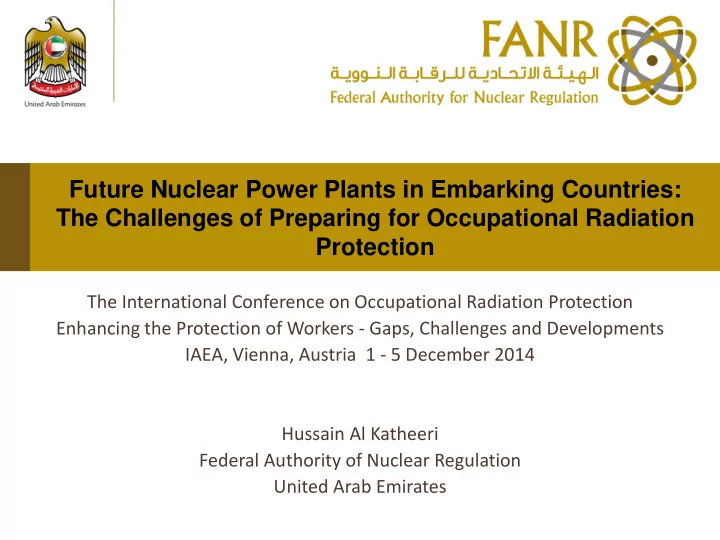

Future Nuclear Power Plants in Embarking Countries: The Challenges of Preparing for Occupational Radiation Protection The International Conference on Occupational Radiation Protection Enhancing the Protection of Workers - Gaps, Challenges and Developments IAEA, Vienna, Austria 1 - 5 December 2014 Hussain Al Katheeri Federal Authority of Nuclear Regulation United Arab Emirates
Formation of FANR and Nuclear Law • Nuclear Law: Federal Law by Decree No 6 of 2009 Concerning Peaceful Uses of Nuclear Energy • Legal framework for Safety, Security, Safeguards in the Nuclear Sector, which includes conduct of activities with : • nuclear facilities; and • regulated material (radioactive material / radiation generators / nuclear material / trigger list Items and nuclear related dual-use items) • Article (2) invokes the Nuclear Policy and gives priority to Safety, Nuclear Safety, Nuclear Security, Radiation Protection (IAEA definitions) and Safeguards • All regulated by the Federal Authority for Nuclear Regulation (FANR), formed in 2009 (recently turned 5 years old!)
Key Provisions of UAE Nuclear Law • Establishment of FANR and its objectives: • Establishes FANR as an independent legal personality with “full legal competence and financial and administrative independence” • States that FANR shall determine all matters regarding control & supervision of Nuclear Sector to ensure Nuclear Safety and Security, Radiation Protection, Safeguards and international obligations • Management of FANR: • Board of Management • Director General • FANR funding • Now largely through licence fees
Background on the UAE Nuclear Program • The Emirates Nuclear Energy Corporation (ENEC), established in December 2009 is constructing four Korean design APR-1400 units • Barakah Unit #1 is planned to start operating in 2017 and Units 2, 3, and 4 are scheduled to start operating in 2018, 2019 and 2020
Current Status of Facility Licensing • FANR licenses issued to Emirates Nuclear Energy Corporation: • Site Selection Licence • Site Preparation Licence • Limited Construction Licence • Construction Licence for Barakah Units1 & 2 (July 2012) • Construction Licence for Barakah Units3 & 4 (September 2014) • Application for licence to Operate Units 1 and 2 expected in January 2015
Google Earth Image of the Site (~early 2014)
Legislative Framework For Occupational Exposure • In accordance with requirement 2 of GSR part 1 • Publication of the Nuclear Law and the establishment of FANR • FANR-REG-04 “Regulation for Radiation Dose Limits and Optimisation of Radiation Protection for Nuclear Facilities ”: • Requires implementation of ALARA, sets dose limits for workers, and public, requires setting of dose constraints, etc. • FANR-REG-06 “ Application for a Licence to Construct a Nuclear Facility ”: • Requires applicant to provide preliminary information on the RPP, reviewed prior to issuance of construction license • FANR-REG-11 “Radiation Protection and Predisposal Radioactive Waste Management in Nuclear Facilities” • FANR-REG-12 “Emergency Preparedness for Nuclear Facilities”
UAE Nuclear Policy – Six Key Goals • Complete operational transparency • Highest standards of non-proliferation • Highest standards of safety and security • Close cooperation with the IAEA • Partnership with governments and firms of responsible nations • Long-term sustainability
FANR Radiation Protection Infrastructures • Secondary Standards Dosimetry Laboratory (SSDL) • Radiological Response Vehicle • Environmental Laboratory • Gamma Monitoring Network • FANR emergency center (for radiological and nuclear emergencies) • Other programmes supporting Radiation Safety (e.g. national dose register)
Implementation Of Radiation Protection Programmes by The Licence Holder • Barakah NPP incorporates radiation protection measures to ensure that occupational radiation exposures in future operation will be as low as is reasonably achievable(ALARA), e.g.: • Separation of radioactive and non-radioactive components • Use of shielding • Use of remotely operated equipment • Ventilation systems – cascading airflow from least to potentially highest contamination areas • Installation of permanent radiation and contamination monitoring systems • Training of personnel in radiation protection • Development and implementation of administrative policies and procedures to maintain exposures ALARA • Dosimetry, alarming dosimeters, etc. • Radiological Environmental Monitoring Programme (REMP) • Radiation protection training and development • Emergency response infrastructure, offsite emergency center, etc.
Challenges Encountered in a New Emerging Nuclear Country From a Regulatory Perspective (1) • Training • Maintaining adequate levels of expertise: • Scholarship programs • Assignments to Korean Institute for Nuclear Safety (KINS) and US-NRC • RISKTEC programme in UK • Gulf Nuclear Energy Infrastructure Institute (GNEII) at Khalifa University • Institute of Radiation Protection and Nuclear Safety (IRSN) • International Nuclear Safeguards and Engagement Programme (INSEP) • Various IAEA missions
Challenges Encountered in a New Emerging Nuclear Country From a Regulatory Perspective (2) • Diversity: • FANR staff from many different countries, with differing regulatory approaches • Important to develop a common approach to radiation protection • Important to develop effective communication and cultural awareness • Dosimetry service: • Developing an approved dosimetry service provider under an adequate quality management system • IAEA mission on Occupational Radiation Protection Appraisal Service (ORPAS) to develop an action plan for the infrastructure and monitoring of exposed workers
Conclusions • The challenges to develop an ORP programme as a regulator in an emerging nuclear country are vast and complicated • The regulator is responsible for ensuring the health and safety of the workers, public and environment • FANR has made significant progress in developing ORP infrastructure • FANR is continuing to improve its preparation for the ORP through: • Issuing more related regulations and regulatory guides • Assure the implementation of ORP programmes by the licensees • Maintaining an adequate level of expertise in the nuclear field
ركشً ا Thank You! www.fanr.gov.ae 14
Recommend
More recommend